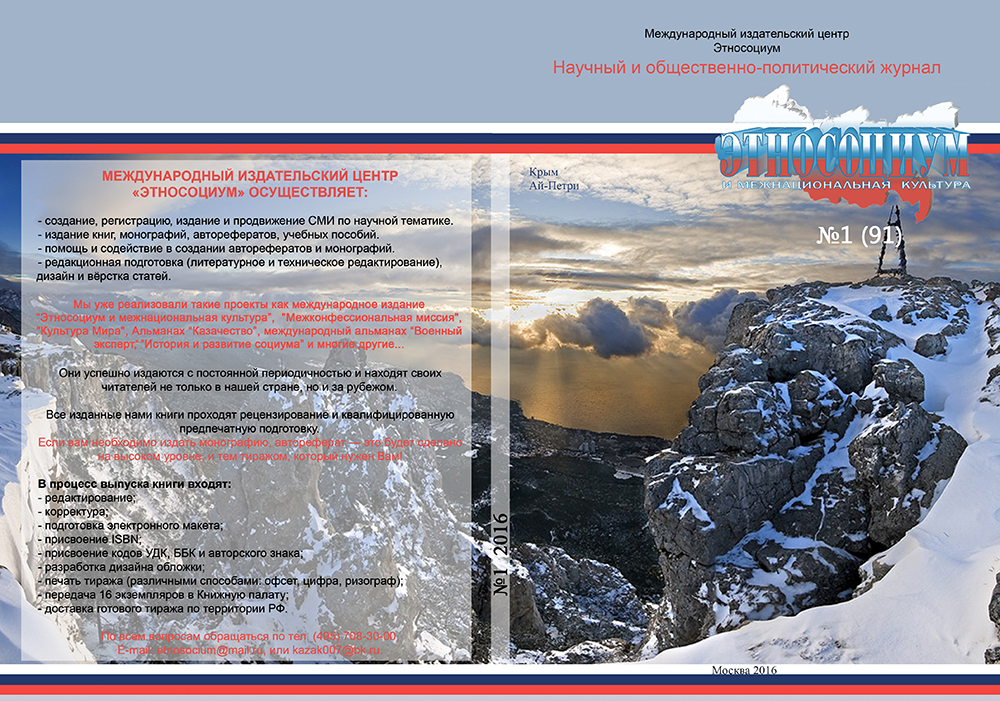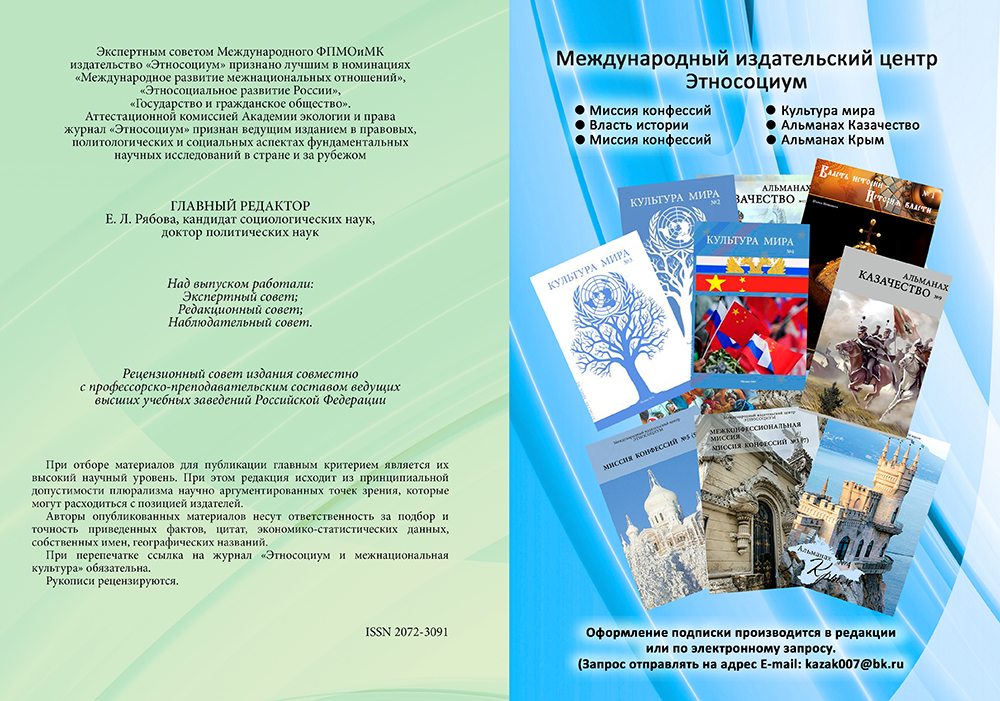

Content
|
COUNCIL OF INTERNATIONAL RELATIONSHIP
|
|
|
Mikhailova N.V. Peculiarities of Formation of State, Civil and Ethnic Identity of the Russian People in Post-Soviet Russia
|
11
|
|
POLITICS, ECONOMICS, LAW:
ACTUAL PROBLEMS OF MODERN SOCIETY
|
|
|
Petrova O.N., Ananchenkova P.I. Continuous Professional Development as Element of National Education System
|
18
|
|
Ulyanova T.A. Formation of Tolerance among Students
|
22
|
|
Masich V.A., Masich E.V. Adaptive Aspect of Education as a “Soft Power” Instrument
|
26
|
|
POLITICS, ECONOMICS, LAW:
REGIONAL STUDY
|
|
|
Shuplenkov O.V. Solonevich I.L. on the Future of Russia’s National Regeneration
|
31
|
|
Anciferova I.V., Ermakov V.M. The Common and the Particular in the Mentality of Russian Voters in Terms of Cluster Analysis
|
37
|
|
Nigmatullina T.A. The Institution of the Family as One of the Factors of Children’ and Youth’s Political Socialization
|
43
|
|
INTERNATIONAL RELATIONSHIPS:
POLITICS, ECONOMICS, LAW
|
|
|
Bormotova T.M., Nikitina I.E. The Problem of Rapprochement of National Legislations of Member Countries of the European Union in the Matters of Migration Policy
|
51
|
|
Ezhova M.Y. Civil Identity in the Context of Modern Political Process in Tajikistan
|
55
|
|
Ivanova T.S. Political Problems of Argentina: in Search of the Balance of Interests in the Changing World (a case study of Latin American mass media)
|
59
|
|
People's Republic of China
|
|
|
Evtyushin K.A. Xi Jinping’s «One Belt, One Road» Strategic Plan: Some Innovations of People’s Republic of China’s Foreign Policy
|
65
|
|
Fu Syaosya Li Qingzhao and Her Daily Routine
|
70
|
|
Kazanin M.V. PRC’s Cultural Security in Terms of Globalization: Concepts and Issues Providing Directions
|
77
|
|
SEVASTOPOL:
Economics and Law
Etnoekonomika in the sustainable development of regions of Russia: the legal basis
Legal regulation of public-private partnerships in a global economy
Russia: state and society in the new reality
|
|
|
Shestov S.N., Chimiris S.V. Economic Security of the Crimea
|
88
|
|
Kondratyuk D.L. On the Practice of Disputing the Resolution to Appeal the Decisions of the State Registrar Concerning the Registration of Land Ownership
|
93
|
|
Osipova E.V., Loza G.G. The State Youth Policy in the Russian Federation and Its Influence on the Electoral Activity during the Elections
|
99
|
|
Faterina A.A., Loza G.G. Internet as a Means of Manipulation of Youth Electorate (with the Federal City of Sevastopol as an Example)
|
104
|
|
Alisova V.V. Moscow’s Regional Policy in the North Caucasus direction in the Epoch of Ivan the Terrible
|
112
|
|
Gasanov G.G. State Youth Politics in Russia: Problems and Perspectives
|
119
|
|
Efimova O.S. Russia’s Management Practice towards the Kalmyk Khanate
|
125
|
|
Annotations
|
130
|
|
Authors
|
139
|
|
Requirements to materials submitted to the international publishing house "Etnosocium"
|
143
|
In the article, the author describes peculiarities of formation of three particular types of self-identity, that is, the state (civilizational), civil (political), ethnic (personal and regional) in their interconnection.
Keywords: civilization, identity, self-determination, ethno-nation, nation state, civilization state.
In the article, we dwell upon some questions of development of the system of continuous education. We define the main principles and tasks of the functioning of the education system of continuous development, as well as the main strategic landmarks that characterize national education politics.
Keywords: education, skills set, education system, continuous education.
The article deals with the development of tolerance among students as a way to prevent conflicts in multi-ethnic civil society. Tolerance among young people is asserted as an active moral force. It is considered as readiness for positive interaction with other cultures, ethnic groups, people of different nationalities and religious beliefs.
Keywords: tolerance, multi-ethnic society, tolerance, education, student transportation.
The article deals with a psychological context of the “soft power” concept. The author takes the so-called adaptive aspect of education as a special case considering it as an instrument of “soft power”.
Keywords: soft power, international relations, politics, psychology, adaptation, education, Joseph Nye.
The relevance of the study of the scientific heritage of I.L. Solonevich on national state-building is a new insight of the future of the project proposed by this prominent Russian figure in the national-conservative movement in the first third of the twentieth century. The questions that were in the sphere of interests of the scientist were concerned with the government, local government, national autonomy, individual rights and freedoms, constitutional forms of national identity and the role of the legislative and judicial organs of government in the regulation of international relations.
Keywords: polity, monarch, Moscow Kingdom, people, The People’s monarchy, national-conservative movement, nationalism, the national question, autocracy, Solonevich I.L..
The authors of the article give an attempt to give a review of some common features and the mentality specifics of different categories and Russian voters, as well as their objective predicament by social and economic factors of the external environment.
Keywords: cluster, mentality, the particular, the common, objective predicament, voters.
In today’s reality, the article considers relevant the role of the family in shaping the younger generation’s value orientations, primarily political ones. The author analyzes different points of view on the problem that justifies its own position. In addition, the article presents the results of a survey of attitudes among parents of early political socialization of children and their participation in this process, as well as surveying children to determine their political competence.
Keywords: political science, children, family, political orientation, values, citizenship, activity, and patriotism.
The authors focus on conceptual issues relating to the regulation of migration and combating cross-border crime in the European Union.
Keywords: European Union, illegal immigration, migrants, migration policy, civil society.
This article deals with the problems of formation of civic identity in the process of nation-building in Tajikistan. The author presents the analysis of the socio-political and economic factors behind the crisis of identity in the post-Soviet transformation. The influence of the religious factor in the formation and development of civic consciousness Tajiks is dwelled upon.
Keywords: civil identity, national identity, religious identity, transformation.
In the article, we analyze some problems of establishment of a political course of the new Argentinean government. The author dwells upon the question of the Falkland Islands in the context of relationships of Argentina with the United States and Great Britain. The study conducted gives an overview and a possible perspective of Russia-Argentina relationships in the new political reality.
Keywords: Russia-Argentina relationships, Mauricio Macri, Peronism, Cristina Kirchner, the Falkland Islands, las Islas Malvinas.
The article deals with the characteristics of China’s foreign policy and strategy after assuming the leadership of the fifth generation. The features of “pairing” of the Eurasian Economic Union and the Silk Road Economic Belt are underlined.
Keywords: foreign policy, «grand strategy» of PRC, economic plans.
As it was stated by a romantic poet Johann Christian Friedrich Holderlin, “a man dwells in this world poetically”. It gives evidence to people’s yearning of poetry. But which life is considered to be poetical? What kind of conditions are necessary for such life? Here, we are going to have a look at the daily habits of Li Qingzhao (1084-1155), the most famous poetess of the ci-form (special song rhymes) in the Chinese history, and we will find out what kind of life is poetical from her point of view.
Keywords: Li Qingzhao, poetry, poetic life, housing, characters, skills, dressing.
The article is devoted to the institution of cultural security, which is now in the People’s Republic of China is considered on a par with such components of national security, as the military and political security. The article describes the approach to the definition of “cultural security”, developed by Chinese scientists, systematized cultural security challenges and methods of confronting these challenges. The basic elements of the strategy plan “strong cultural state” was adopted by the CPC Central Committee in 2007 and is currently being implemented, as well as the characteristics of other documents regulating the activities of public authorities in the field of Chinese cultural construction.
Keywords: culture security, Chinese culture, ideology, globalization.
The article deals with the issues related to the development of the theory of economic security of the Republic of Crimea and Sevastopol as new subjects of the federation. The sources of threats to economic security are described. The priorities of regional policy aimed at improving the economic security of the region are proposed.
Keywords: economic security, the Republic of Crimea, the city of Sevastopol, risks, threats, volatility, resource-dependence.
The article considers the problems of appeal against the state registrar decisions that refuse state registration of land ownership when it comes to earlier emerged rights in the Republic of Crimea and Sevastopol. The author speaks on the typical errors of judicial decisions in this category of cases that caused groundlessness and the illegality of such decisions. It is concluded that it is necessary to clarify the Resolution of the Plenum the Supreme Court’s that resolves the features of this category of disputes and justifies the use of a special procedure for registration of the ownership rights as “before arisen” rights in the Republic of Crimea and Sevastopol.
Keywords: the formation of a uniform judicial practice; Crimea and Sevastopol; appeal against decisions of the state registrar; denial of the state registration of land ownership; special procedure for registration of property rights as a of previously arisen rights; violation of the rights of individuals to own, use and dispose of land.
In this article, the authors hold a discussion of a situation with the youth as a particular social-demographic group in the sphere of political and electoral processes. The authors present a political analysis of the state’s activity of teenagers’ policy in Russia, its drawbacks and possible directions in the sphere of realization and development.
Keywords: youth policies, electoral activity, suffrage, implementation problematics.
The article deals with the phenomenon of manipulation of the youth electorate, which is a problem in the formation of the modern electoral process in the Sevastopol city. The authors also explored methods of manipulating youth electorate in the electoral process; its main problems are identified and ways of their solutions are offered.
Keywords: right, elections, electoral process, electoral right, consciousness manipulation, democracy, legal system.
On the basis of analysis of the historical, cultural and political sources, the article reveals the character of “regional” policy of Ivan the Terrible against the North Caucasian territories and ethnic groups.
Keywords: Moscow, region, regional policy, the peoples of the North Caucasus, fighting, ethnic groups, union.
In the article, the author speaks on the influence of youth politics on the processes of formation of the civil society in modern Russia. Its current state and its perspectives are analyzed.
Keywords: youth, youth policy, legal education, political education.
In the article, the author investigates the system of public administration in Kalmyk Khanate as part of the Russian state (XVII – XVII centuries), and its reforming process.
Keywords: Russian state, Kalmyk Khanate, system of public administration, history.